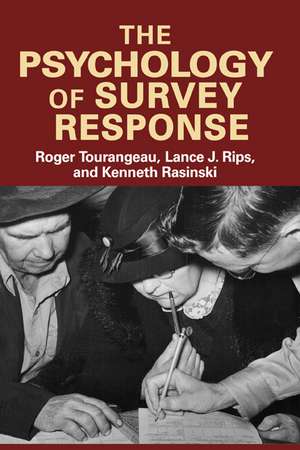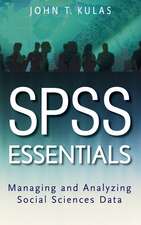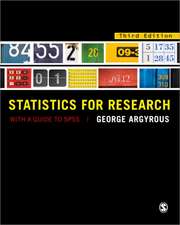The Psychology of Survey Response
Autor Roger Tourangeau, Lance J. Rips, Kenneth Rasinskien Limba Engleză Paperback – 12 mar 2000
Preț: 435.21 lei
Preț vechi: 489.01 lei
-11% Nou
Puncte Express: 653
Preț estimativ în valută:
83.30€ • 90.52$ • 70.02£
83.30€ • 90.52$ • 70.02£
Carte tipărită la comandă
Livrare economică 21 aprilie-05 mai
Preluare comenzi: 021 569.72.76
Specificații
ISBN-13: 9780521576291
ISBN-10: 0521576296
Pagini: 416
Ilustrații: 14 b/w illus. 40 tables
Dimensiuni: 154 x 228 x 27 mm
Greutate: 0.61 kg
Ediția:New.
Editura: Cambridge University Press
Colecția Cambridge University Press
Locul publicării:New York, United States
ISBN-10: 0521576296
Pagini: 416
Ilustrații: 14 b/w illus. 40 tables
Dimensiuni: 154 x 228 x 27 mm
Greutate: 0.61 kg
Ediția:New.
Editura: Cambridge University Press
Colecția Cambridge University Press
Locul publicării:New York, United States
Cuprins
1. Introduction; 2. Respondents' understanding of survey questions; 3. The role of memory in survey responding; 4. Answering questions about date and durations; 5. Attitude questions; 6. Factual judgments and numerical estimates; 7. Attitude judgments and context effects; 8. Mapping and formatting; 9. Survey reporting of sensitive topics; 10. Mode of data collection; 11. Impact of the application of cognitive models to survey measurement.
Recenzii
"A superb job...Offers an excellent and unique account of cognitive and communicative influences in survey situations. The insights it provides make it an indispensable source for both researchers and practitioners." Contemporary Psychology
"For survey researchers, it provides a very scholarly and readable review of psychological theorizing and its implication for survey responding; for psychologists it offers a range of important phenomena that broaden the scope of psychological inquiry. . . . Readers are guaranteed to gain highly useful new insights from the author's masterful integration of research." International Journal of Public Opinion Research
"The Psychology of Survey Response provides a masterful review and integration of what we know about survey responding. Written by some of the leading researchers at the interface of psychology and survey methods, this book will be of great interest to survey researchers and psychologists alike." Norbert Schwarz, University of Michigan
"This is the best and most comprehensive book in the growing literature on the psychology of survey responding. It includes useful summaries of the behavioral science, often providing better exposition than the primary sources, and it draws clear, useful implications for practice. It is a landmark example of the application of scientific theory and laboratory findings to real life problems." Reid Hastie, University of Colorado at Boulder
"For survey researchers, it provides a very scholarly and readable review of psychological theorizing and its implication for survey responding; for psychologists it offers a range of important phenomena that broaden the scope of psychological inquiry. . . . Readers are guaranteed to gain highly useful new insights from the author's masterful integration of research." International Journal of Public Opinion Research
"The Psychology of Survey Response provides a masterful review and integration of what we know about survey responding. Written by some of the leading researchers at the interface of psychology and survey methods, this book will be of great interest to survey researchers and psychologists alike." Norbert Schwarz, University of Michigan
"This is the best and most comprehensive book in the growing literature on the psychology of survey responding. It includes useful summaries of the behavioral science, often providing better exposition than the primary sources, and it draws clear, useful implications for practice. It is a landmark example of the application of scientific theory and laboratory findings to real life problems." Reid Hastie, University of Colorado at Boulder
Descriere
Examines the complex psychological processes involved in answering different types of survey questions.















